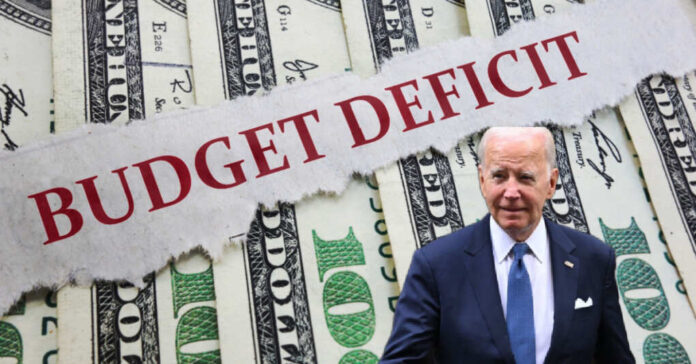
Treasury Secretary Janet Yellen revealed that the United States faces a fiscal 2023 deficit of $1.7 trillion. That would be astounding enough if it were true. When including President Joe Biden’s $300 billion in purchasing votes under the guise of student debt relief, the actual deficit balloons to $2 trillion.
In comparison, 2022’s deficit was less than $1 trillion. That means that the deficit has more than doubled under the Biden administration in 2023 alone. And Biden still has a month to continue spending like a drunken sailor.
And this time, the Biden administration can’t blame the pandemic. His inability to stop spending money is his responsibility alone.
And it comes at a cost to taxpayers. To tackle Biden’s inflation, the Federal Reserve increased interest rates to over 5%, subsequently lowering it to about 4%. However, even at 4%, this rate remains twice the Federal Reserve’s intended target. Americans are forced to put their dreams of buying a house, purchasing a car, or even paying off credit cards on hold.
The federal deficit is the difference between the revenue the government takes in versus what it owes. The deficit negatively impacts the total national debt, which is currently at a staggering $33 trillion.
Part of the deficit’s growth was a decrease in revenue caused by higher interest rates. Due to these rate hikes, the government had to allocate an extra $184 billion to cover interest on the deficit compared to the prior year. Moreover, financial institutions like Silicon Valley Bank and First Republic had to fork out an additional $101 billion to account holders unprepared for these rate increases.
A 9.3% decline in income tax revenue can be attributed to reduced capital gains, primarily influenced by the uncertainty in the stock market. Meanwhile, the increasing bond yields suggest that creditors may become less willing to back U.S. debt unless they receive higher returns, putting outside pressure on the government to limit its spending.
Demographic factors and how entitlement programs are structured have driven the United States’ fiscal challenges for quite some time. But President Biden’s unchecked spending policies and the Democrats’ inclination to continue to borrow more have worsened existing deficit issues.
On Labor Day, while addressing the Sheet Metal Workers Local 19 in Philadelphia and discussing his administration’s efforts to create well-paying union jobs and enhance manufacturing, President Biden took a moment to tout his administration’s “fiscal achievements.”
Puzzlingly, he stated, “And even with what we’ve done—unlike the last President—in my first two years, all this stuff—guess what? I cut the deficit by $1.7 trillion. Here’s the bottom line: My economic plan is working. It’s reducing the deficit.”
But facts don’t lie. Only the president does.
Even CNN had to fact-check the speech, during which Biden falsely claimed an improvement in the budget situation for 2021 and 2022 because of a tax policy scheduled to take effect in 2023. He also claims to have reined in the national debt. The far-left news organization also fact-checked his claim that he has overseen an “actual surplus.”
Per CNN, Biden’s claims were inaccurate on multiple fronts. He hasn’t reduced the national debt, which grew significantly during his presidency. The reported deficit reduction is about the annual budget deficit, not the total national debt, and is also completely untrue. The corporate minimum tax he mentioned only came into effect in 2023 and couldn’t have impacted deficits in 2021 and 2022. Lastly, there’s no actual surplus, as the federal government continues to oversee a deficit that has reached historic highs.
How bad is it when CNN calls out Biden’s false claims? Bad enough that even the Washington Post awarded him a “Bottomless Pinocchio.”
This deficit is unprecedented outside of times like war, deep recession, or a pandemic. The striking deficit figure was stunning enough that it was reported by The Washington Post’s Jeff Stein, who highlighted the significance of these massive spending imbalances, which can result in higher short-term interest rates for consumers, including those with mortgages. These increasing interest costs will eclipse other federal priorities in the long run.
At this point, a nearly bankrupt America can only hope that the sitting president isn’t aware of the number that follows “trillion.” Hint: it’s a quadrillion, and the Biden administration seems more than eager to reach it next year.














